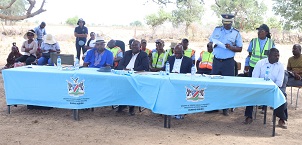
UN Secretary General spurs Security Council to fair first debate on Artificial Intelligence

By Freeman Ya Ngulu.
UN Secretary General António Guterres’ thanked the United Kingdom for convening the first debate on artificial intelligence (AI) ever held by the Security Council. His earlier remarks to the Security Council in New York in July are still relevant following theat members of the BRICS have decided to establish an “AI study group” to create and oversee AI governance frameworks.
Furthermore, the finance industry estimates AI could contribute between US$10 and US$15 trillion to the global economy by 2030. Almost every Government, large company and organization in the world is working on an AI strategy.
The BRICS countries intend to establish an “AI study group” to track the growth and development of the technology, according to proposals outlined by Chinese President Xi Jinping. The proposal was under discussion on the second day of the BRICS meeting which took place in Johannesburg, South Africa, last week.

Professor Michael Zimba, African Union Contributing Expert on Artificial Intelligence and Director of the Malawi Institute of Technology said “When we say all global governance bodies and all individual countries, regardless of their socioeconomic status, need to put Artificial Intelligence on their priority lists, we mean every word of the recommendation, and in good faith. Let nations learn to look beyond 5 or 10 years. The next superpower won’t be ordinary.”
Zimba said this referring to the 2023 World Robot Conference where robots stole the show as China displayed its latest tech breakthroughs. Humanoid robots are becoming ever more lifelike and canine-inspired robots are ever more obedient and agile thanks to artificial intelligence and other tech developments.
“I have been following the development of AI for some time. Indeed, I told the General Assembly six years ago that AI would have a dramatic impact on sustainable development, the world of work and the social fabric. But, like everyone here, I have been shocked and impressed by the newest form of AI, generative AI, which is a radical advance in its capabilities.” Guterres said.
But, even its own designers have no idea where their stunning technological breakthrough may lead. It is, Guteres said, clear that AI will have an impact on every area of our lives, including the three pillars of the United Nations. It has the potential to turbocharge global development, from monitoring the climate crisis to breakthroughs in medical research. It offers new potential to realize human rights, particularly to health and education. But, the High Commissioner for Human Rights has expressed alarm over evidence that AI can amplify bias, reinforce discrimination and enable new levels of authoritarian surveillance.
AI is being put to work in connection with peace and security by the United Nations. It is increasingly being used to identify patterns of violence, monitor ceasefires and helping to strengthen peacekeeping, mediation and humanitarian efforts. Without action to address risks, Guterres said we are derelict in our responsibilities to present and future generations.
“One is the 2018-2019 guiding principles on lethal autonomous weapons systems, agreed through the Convention on Certain Conventional Weapons. I agree with the large number of experts that have recommended the prohibition of lethal autonomous weapons without human control.”
A second is the 2021 recommendations on the Ethics of Artificial Intelligence agreed through the United Nations Educational, Scientific and Cultural Organization (UNESCO).
“I therefore welcome calls from some Member States for the creation of a new United Nations entity to support collective efforts to govern this extraordinary technology, inspired by such models as the International Atomic Energy Agency (IAEA), the International Civil Aviation Organization (ICAO) or the Intergovernmental Panel on Climate Change.” Guterres said.













































